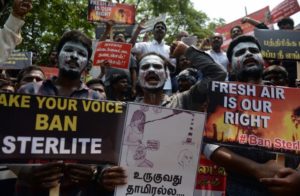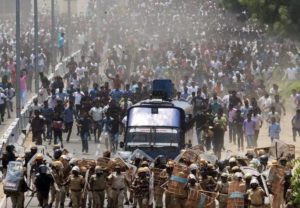Thoothukudi Sterlite Protest: Another Environment v/s Profit War
The Thoothukudi Sterlite protest serves as a testimony of how big corporates like Vedanta getaway with accidents resulting from negligence, damage to ecology, illegal activities without any government scrutiny.
I
 t is almost nine days since 13 people laid their lives protesting against Vedanta’s Sterlite copper smelting unit in Thoothukudi, Tamil Nadu. A pro-environmental peaceful march took an ugly turn when big corporate companies like that of Vedanta were disrupted in its functioning and people were forcefully stopped by violent supression from the police forces in the form of unprecedented firing. As per Fathima Babu, an environmental activist who was part of the protest and also filed petition against the Sterlite Industries Limited, the peaceful march was organised with the permission of the administration in charge as decided in a peace talk held on 20 May, 2018 (two days before the actual march).
t is almost nine days since 13 people laid their lives protesting against Vedanta’s Sterlite copper smelting unit in Thoothukudi, Tamil Nadu. A pro-environmental peaceful march took an ugly turn when big corporate companies like that of Vedanta were disrupted in its functioning and people were forcefully stopped by violent supression from the police forces in the form of unprecedented firing. As per Fathima Babu, an environmental activist who was part of the protest and also filed petition against the Sterlite Industries Limited, the peaceful march was organised with the permission of the administration in charge as decided in a peace talk held on 20 May, 2018 (two days before the actual march).
The Tamil Nadu government has now permanently sealed Sterlite Copper, the Vedanta Group’s copper smelter plant in Thoothukudi. This order came as a result of the killing of 13 persons in a police firing at an anti-Sterlite rally. The local people had been protesting for more than 100 days, as they wanted Sterlite’s copper smelting unit in Thoothukudi to shut down as it was causing environmental damage to the area. The company was also accused of being lax regarding environmental regulations, causing detriment to the health of the locals in and around Thoothukudi.
The protest broke out on March 24, 2018 with people gathering to protest the expansion of the plant. Sterlite had applied for clearance, but the Tamil Nadu Pollution Control Board(TNPCB) rejected their application. The protesters claimed that the company had continued construction despite not having received an approval to do so.
“A preliminary analysis of the tragic killing of anti-Sterlite protesters and the protest itself at Tuticorin reveals that it resulted due to a faulty or incomplete Environmental Impact Assessment (EIA) study of the plant in the first place. If the process of obtaining the Environmental Clearance was duly followed, without hiding any facts or circumventing the provisions of the EIA policy, the project would have certainly received flak during the Public Hearing process and would not have led to the unnecessary deaths of innocent civilians who were only exercising what is guaranteed to them in the Constitution of India.” Dr. Govind Singh, Director (Honorary), Delhi Greens NGO.
 This is not the first instance where Vedanta has been accused of such illegal activities. Orissa Mining Corporation v/s Ministry of Environment and Forest & others was a landmark decision by the Supreme Court of India, which declared that gram sabha has a role to play in safeguarding the customary and religious rights of the STs and Other Traditional Forest Dwellers (OTFDs), like under the Forest Rights Act. The Apex Court maintained that the decision lies with the locals.
This is not the first instance where Vedanta has been accused of such illegal activities. Orissa Mining Corporation v/s Ministry of Environment and Forest & others was a landmark decision by the Supreme Court of India, which declared that gram sabha has a role to play in safeguarding the customary and religious rights of the STs and Other Traditional Forest Dwellers (OTFDs), like under the Forest Rights Act. The Apex Court maintained that the decision lies with the locals.
In 2010, the Ministry of Environment and Forests rejected the stage II clearance given to Odisha Mining Corporation Limited (OMC) on the ground that mining in Niyamgiri violates the provisions of the Forest Rights Act (FRA), 2006, the Environment Protection Act and the Forest Conservation Act. OMCL, the state government company, is slated to supply bauxite to Vedanta’s Lanjigarh refinery on the foothills of Niyamgiri. OMC challenged the rejection in the Supreme Court in 2011. On 18 April 2013, the Supreme Court ruled that gram sabhas would not only consider fresh claims under, FRA but also decide if mining will infringe religious and cultural rights of forest dwellers. The Supreme Court’s judgment of 2013 ordered that the 12 gram sabhas of the Dongaria Kondh, Kutia Kandha and other tribal communities would decide if they held any religious and other rights over the Niyamgiri Hills of Orissa and if the mining of bauxite in the Lanjigarh mines below the peak of the hill would affect their religious rights.
The Tamil Nadu protestors could not cite the Niyamgiri judgement as it was inconspicuously made to cater to only the Orissa issue so that it could not be used as a precedent later. In Tamil Nadu, no pristine forest, wildlife or biodiversity; no vulnerable tribal or forest-dwelling communities; no threat to indigenous culture; no sacred rivers, forest and landscapes were involved. Yet, the Tamilians could achieve their goal because of their sub nationalistic unity that sees no upper caste or lower caste, rural or urban when it comes to issues of state relevance.
Moreover, the people in Tamil Nadu have always been actively involved in the state politics, especially in the matters of environment and health. They have always voiced their opinions and made the government take note of their demands. Be it the Sethusamudram Shipping Canal Project, the Kudankulam Nuclear Power Plant, the Jallikattu ban issue, or any other socio-political-cultural issue, Tamilians have always made their opinion prevail.
Interestingly, Norges Bank, a few years ago, decided to not invest funds from Norway’s Government Pension Fund Global (GPFG) in Sterlite due to unacceptable levels of risk to the environment and various human rights violations involved.
Various public sector and private sector corporations in India have been excluded from receiving GPFG funds because of their adverse track record relating to environmental damage or human rights violations or engaging in operations that are unacceptable to the ethical principles that inform their investment decisions. According to the Council on Ethics which guides the investment decisions of GPFG, the case against Vedanta’s exclusion is not just its operations in Thoothukudi, but also its track record at the refinery near Mettur dam in Tamil Nadu, mining operations in Niyamgiri Odisha, and the refinery in Lanjigarh, Odisha and other operations. The decision to blacklist Sterlite and its sister companies was first taken in 2007.
However, the Thoothukudi Sterlite protest serves as a testimony of how big corporates like Vedanta getaway with accidents resulting from negligence, damage to ecology, illegal activities without any government scrutiny. Sadly, it took 13 lives for the government or the political groups and even the media across the country to notice this protest and make it to prime time discussions on news channels.
